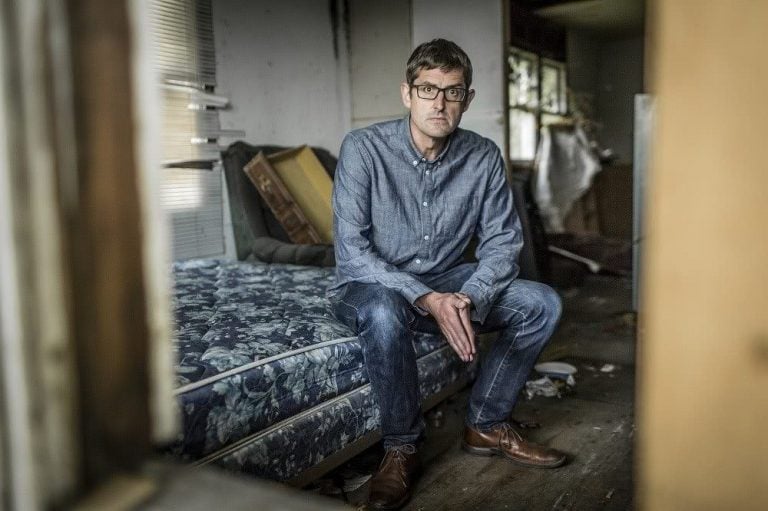After almost 20 years spent documenting some of the most culturally taboo practices and communities in the Western world, filmmaker Louis Theroux continues to create work that, at its most effective, pairs compelling narratives with raw, deeply human vulnerability.
Such is the case with his upcoming film Heroin Town, one of three he recently shot in the United States, all of them linked by an emphasis on dysfunctional situations and communities. The film shines a light on the country’s devastating heroin problem – one prompted by the rampant over-prescription of and subsequent crackdown on legal painkillers. Focusing on the city of Huntington in West Virginia, Theroux follows the day-to-day lives of several residents who have been gripped by the epidemic, in a place where one in ten babies is born dependent on opiates.
In Huntington, the story was every bit as awful as it had been described – actually, if anything it was worse.
Like most of Theroux’s work, an unashamed desire to create something that provokes a sense of human connection and empathy lies at the film’s centre. “I’ve found the most powerful programs I’ve been involved in have been ones where I haven’t driven the story too much”, says Theroux over the phone from the States. “I’ve allowed the people I’m with to take ownership of their own stories and the process.”
Surrendering the role of storyteller to those whose lives Theroux documents not only helps the audience connect better to them, he says, but also creates a level of drama. After all, when he commits to being the passenger rather than the driver, he is forced to surrender some control; to let things happen that his instincts might have otherwise convinced him to shut down.
For instance, one of Heroin Town’s first sequences sees Theroux asked to tag along as a woman and her seemingly manipulative boyfriend go to score heroin, the situation very much not something Theroux planned for that day. “It was just sort of a case of, ‘Let’s go with what happens’, even though it felt as though it could potentially be a bit dangerous or unsettling. There’s an enormous power in being able to be invited into [those situations] by people”.
While filming, Theroux was surprised at just how closely the situation aligned with the available data. “Very often when you do a story, you’re given a certain version of events. You read the research and a pattern is there and theories are advanced as to why such a phenomenon exists. It’s rare that you go on location and find it confirmed so universally. In Huntington, the story was every bit as awful as it had been described – actually, if anything it was worse.”
Indeed, perhaps the most devastating thing about Heroin Town is how eerily inevitable it all feels – the tragedy comes from the way the characters and their life stories fit an almost cookie-cutter causality. “Almost to a one, they had either been prescribed opiates legally by a doctor for a condition or an injury, or a friend or family member had and they’d been exposed that way. I can’t think of a single person I spoke to who came to heroin because they were curious about it without a preceding legal opiate addiction. There’s no ambiguity to what was behind that epidemic.”
I think the really scary possibility is that [Trump] could be re-elected.
It’s a difficult negotiation, Theroux says, navigating the space between letting contributors drive the onscreen narrative while also recognizing he regularly works with distressingly vulnerable demographics. “When you’re on location, there’s a sense you need certain phenomenon to take place in order to film it and bring the news about it. At the same time, you’re dealing with sometimes very upsetting real life problems. As with so many things in life, there are multiple motivations and different feelings jostling together when you’re involved in something like this. It’s an odd experience. I also feel as though I’m a guest: I don’t want to be obviously judgemental.”
Theroux’s signature style of frank observation is an undercurrent to the film, and he speaks to his subjects with a candor that oscillates between terribly awkward and deeply empathetic. “If a camera hadn’t been there I’m not sure I’d have said what I said. It’s a need to have my thoughts recorded in a way that viewers can experience them – because of my journalistic role, I feel like it’s important to say it out loud.”
Theroux is currently living in America again, working in the country at a time when the overarching social and political climate is marked largely by uncertainty – the country going through “something of a convulsion”, as Theroux describes it, thanks to the Trump presidency.
“For his supporters, there’s a feeling of excitement; that quasi-revolutionary fervour. For those who aren’t fans, though, it’s a frightening time. There’s an apocalyptic feeling that we’ve got a real loose cannon in the White House, someone who is perhaps racist, is perhaps unstable, and who could change the world in a kind of frightening way. It feels as though it’s very much up in the air and no one’s quite sure where we’ll get to in the next year or two. I think the really scary possibility is that he could be re-elected.”
If nothing else, that uncertainty means there’s rarely been a more important time in recent history to document and capture the distressing or uncomfortable. For all that uneasy darkness that Theroux’s filmmaking is so often situated in, he points out that, “You find lightness and humour in the most unlikely places. These films are, in their way, life-affirming.”

































